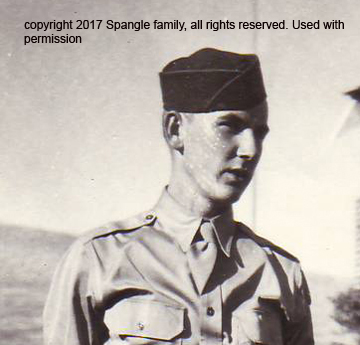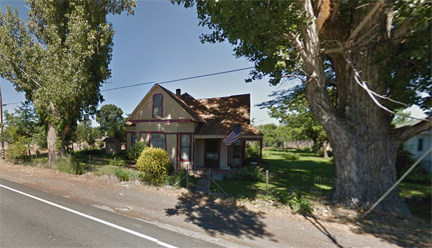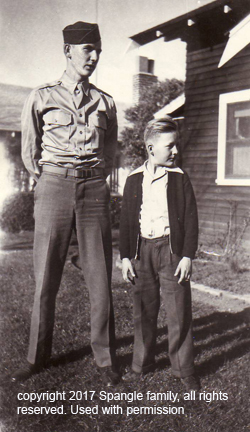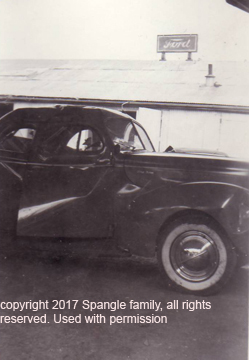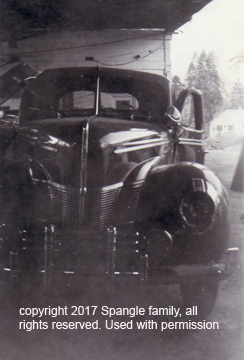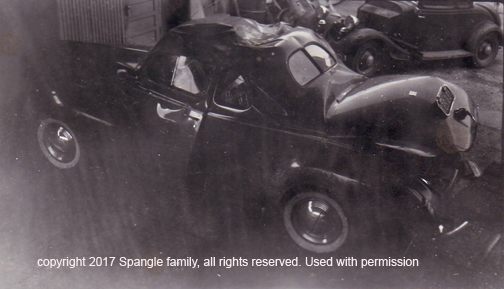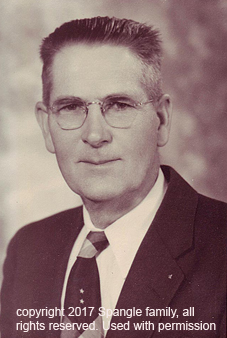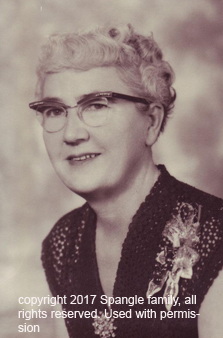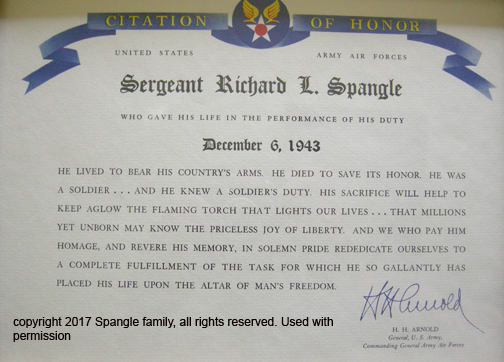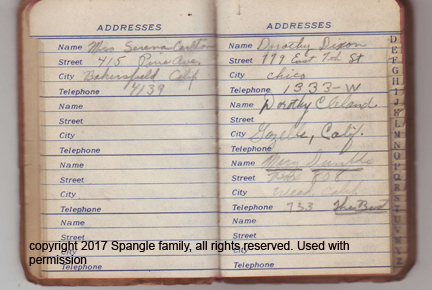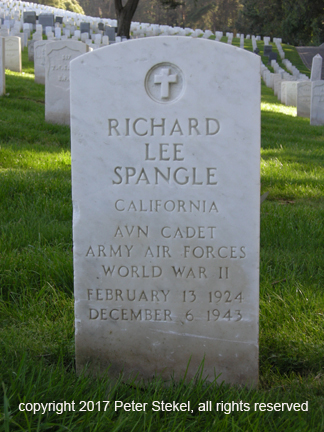|
|
|
Richard Lee Spangle |
|
Unless otherwise stated, all photos on this page are copyright 2017 Spangle Family and used with permission.
|
| I was able to learn quite a bit about Richard Lee
Spangle, gunner on Exterminator, by interviewing his younger
brother, his sister-in-law, and his wife. Richard was born February 13,
1924, the second of three children, to Sherman Lewis (November 27,
1897-1974) and Merle Leah Burns Spangle (1901-1974). They lived in the
house Sherman bought in 1936 for $200 in the tiny settlement
of Gazelle on the far outskirts of Weed, California. The simple two-story
house is still there, flanked by two large cottonwood trees that were old
when the Spangle kids were young. Richardís younger brother, Tom, now
lives there with his wife, Audria.
Ten years his junior, Tom Spangle remembers his nineteen year old brother, Richard, as a hunter, angler, and a kid that wanted to be a pilot.
Richard Spangle and his younger brother, Tom An automobile accident during high school scotched Richard's pilot plans. Richard was the passenger in a friendís car when they missed a turn in the even smaller hamlet of Grenada, north of Gazelle a couple of miles. Interstate 5 has changed the roads around there quite a bit but the turn Richard and his buddy missed by driving too fast is still there, part of what is now Old Highway 99.
Richardís physical examination for flying as an aviation cadet at the Santa Ana Army Air Forces Base in southern California gives the particulars of his disqualification for pilot training. On March 1, 1942 he required three weeks of hospitalization for a compression fracture in his fifth cervical vertebrae. The three medical examiners who reviewed Richardís case concluded, "The physical condition...is likely to result in permanent, partial or complete physical disability." Richard should have been disqualified from the army with such a damning assessment but he wasnít. After all, there was a war and they would take anyone willing to go. Despite what the doctors said, Spangle was still "qualified for general service." So, like many other cadets who washed out, Richard was directed elsewhere: he became a gunner - which probably pleased a country boy like him who liked to shoot. When he enlisted two days after Independence Day, 1942, eighteen year old Richard Spangle was 5'10" and 130 pounds; what they used to call a "long drink of water." The army was a good place for a lot of boys to bulk up, what with all the drill and exercise they were required to do. That and three, large, meals a day. A physical exam in March 31, 1943 had Richardís weight at 137 pounds and by another exam on November 29, 1943 (a week before his death) heíd gained another three pounds. After Richard Spangleís B-24 went down his mother, Merle, was so bereft by grief she simply closed the door to his bedroom and never opened it again. As his brother Tom recalls, "Ever since he went down, she (their mother) hung the flag in the window with the blue star. Had it there for years. They never touched his room until they found him in 1955."
Richard's parents, Sherman and Merle Spangle (undated)
Tom Spangleís daughter, Lori, remembers, "It was like that forever. We could not go in there when we were kids. It was just like it was when he was a teenager. When he died." Tomís wife, Audria, contributed some context for how it was with the Spangle family and so many others who were forced to live with unanswered questions and without closure. "My grandma, on my dadís side: my uncle was missing (during World War II). She always thought he was alive. She never gave up hope. Never gave up hope." Losing her husband was pretty tough for nineteen year old Mary Dumble Spangle. She was visiting Richard in Fresno, to celebrate their first anniversary when Exterminator went down. "When he left that morning he told her, "If you wait for me tonight Iíll take you to dinner." She waited all that night and all the next day. And the next day. Not knowing how to contact her husband at Hammer Field, she sent a telegram to the base. "And that night I was sitting, writing him a letter, and felt this knock on the door and it was three real young officers. They came in and told me, what? I donít remember." What she can remember all these years later is holding on to the end of the bed. "I noticed my knuckles were white and I wondered if I could even unclench my hands off of the end of that bed." One of the other girls staying at the hotel volunteered to sit with Mary Spangle. The officers went back to the base and someone else returned with sedatives that knocked her out. "I donít remember going to bed. I donít remember much of anything." When she awoke the following morning, "My mother was in bed with me." The next few days were horrible. Richardís parents drove down from Weed to Fresno with their son-in-law. Mr. Spangle spoke to some people but to no avail. Mary can remember visiting Hammer Field and talking to somebody and being told no divers were available to explore Huntington Lake and the reservoir couldnít be lowered because the electricity the dam provided was too essential for the war effort. This wasnít the life Mary had imagined when she and Richard were married. It had all been so whirlwind, so spontaneous - so much fun. They knew each other in high school but they didnít go out together. But she had caught his eye. In his address book, which was filled with plenty of girlís names, under the entry for Mary Dumble heíd written, "The Best." And itís underlined too.
Weed was a bustling lumber town in those days with a population of eight thousand. "It was a good place to grow up in. The thing to do then, after graduation, was to go work in the mill," which was running seven days a week. Thatís where Mary and Richard met up again with each other and began to go out. It got pretty serious pretty fast. In July of 1942 Mary was visiting her sister in Sacramento and Richard came south to visit with her. Thatís when he told her about enlisting. "We got the smart idea that if we went to Reno and got married I could go visit him wherever he was stationed." So they did it, ran off and got married. They had six weeks of living together in Weed before Richard was called up. Mary went back home to live with her parents. In 1946 Mary married Dee Witt Condo and together they have raised a family, living in the Sacramento area ever since. She hasnít forgotten Richard Spangle though her memories are clothed in melancholy. "Iíve had a great life with Dee," she says. His father died when he was young and he didnít have anything. He worked hard to achieve success and raise a family with financial security. Like many people who grew up during the Depression, "Richard never really had anything. And I think he was going to be satisfied with having not too much." About all Mary can say so far away from when it happened was that Richard wasnít interested in driving a truck or working in a saw mill for the rest of his life. He had his sights set on doing something in Sacramento after the war. Mary doesnít know what their life together would have been like. "Unless he had his sights raised an awful lot, I donít think we would have had too much of a life."
Richard Spangle, high school football pin On November 14, 1955 Richard Lee Spangleís remains departed the Oakland Army Terminal in a hearse at 1:00 p.m., escorted by SFC Marion L. Solomon. Later that afternoon, attended by his family, Richard was interned at San Francisco National Cemetery, Section NAWS, Site 618-B.
The war affected Weed as much as any other small town. The community suffered and bore its losses. Reflecting upon that, and her own history of loss, Mary Condo says, "I think Richardís death was the first one I can remember that happened that people thought about. There were a few others. But that came along later." |
| | Home | The Crews | B-24 Liberator | Media | Links | Images| |
| | The Author | Books by Peter Stekel | Press Packet | Contact | |
|
|Extended end notes from Beneath Haunted Waters|
|
|
copyright 2017 by Peter Stekel - all rights reserved |

